Our Latest Releases

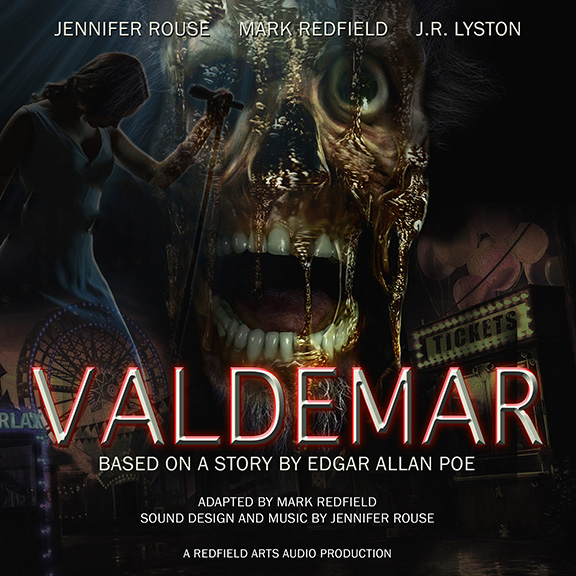
Posted 10/25/20
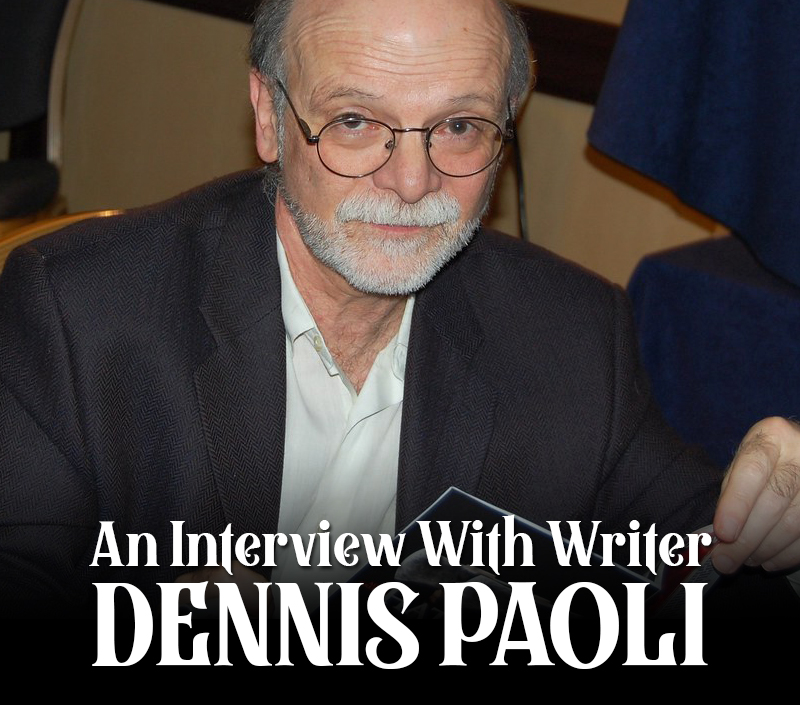
By Mark Redfield
Dennis Paoli writes plays and films. His oeuvre includes adaptations of the works of Poe and Lovecraft. Re-Animator (1985), Dreams of the Witch House (2005), The Black Cat (2007) and Nevermore: An Evening with Edgar Allan Poe, a one-man play starring Jeffrey Combs that has been winning and astonishing audiences around the country since its premiere at The Steve Allen Theatre in Los Angeles in 2009.
Paoli taught writing and Gothic Literature at Hunter College, City University of New York. Now retired from teaching, he is busier than ever, writing. He is also Donor/Advisor of the Heidi Paoli Fund for cancer patients.
I talked with Dennis about his approach to adaptation and screen and play writing, and getting under the skin of the man Edgar Allan Poe.
-----
MARK: How did the play Nevermore come about? There’s a story told by Jeffrey (or Stuart, I can’t remember which) that Stuart Gordon, while directing Jeffrey Combs in the Masters of Horror episode that your wrote, The Black Cat, that after watching him for a few days on-set in costume and make-up said, “You should do a one man show.” Jeffrey’s response, of course, was to gently balk at the idea at first, but that’s another story…
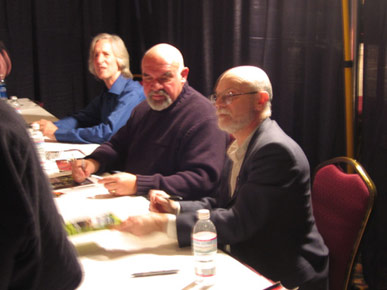 |
Masters of Horror producer Mick Garris, director Stuart Gordon, and writer Dennis Paoli (photo courtesy Icons of Fright) |
DENNIS: (laughs) That’s what I heard. I have never, for the record, I have never been on the set of any of the things that I’ve written that have been produced as films or TV or video. Never. And that’s, you know, standard operating procedure for writers. Writers aren’t always---not only are they not always invited to the set, but even if they were they wouldn’t be welcome, but the fact is, knowing Stuart---
Stuart Gordon is one of my oldest and best friends, and knowing Jeffrey, Jeffrey is a friend of high standing, and knowing everybody I would have thought I would have gotten myself on the set at some point (laughing) and the fact is, Stuart and I, going back, we have acted together.
We acted together in college. We were in a satire comedy group and as a high school student and through college and then we did some professional work together and in every script I’ve written, I’ve written a part with myself in mind.
A small part. So I can actually get on the set and invariably, and this is in absolutely in every case, it’s the first thing to be cut—that character. So, I mean it’s either fate or it’s Stuart seeing through my ruse. But I have never been on set.
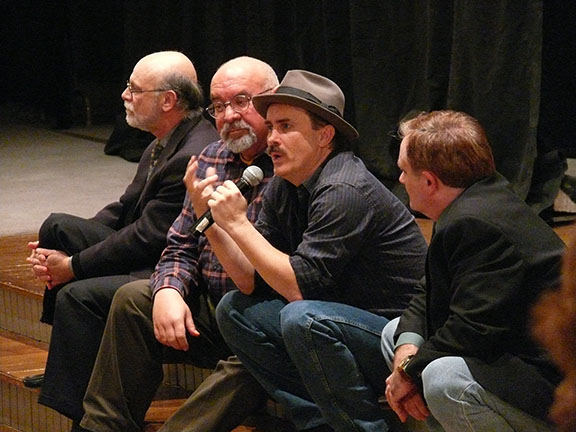 |
Dennis Paoli, Stuart Gordon, Jeffrey Combs and Mark Redfield during an audience question and answer session, after a performance of Nevermore in Baltimore in 2010. (Photo: Jennifer Rouse) |
MARK: But you have to agree that Jeffrey makes a pretty great Poe.
DENNIS: Oh—when I saw The Black Cat, when I saw the cut of The Black Cat, it’s absolutely what I thought. The first thing I thought was that Jeffrey has nailed this, and that it is a part that was made for him, or he was made for. When you sit back and look at that—it sounds prideful to say that, you know, that Jeff is THE person to play Poe—wonderful people have played Poe—John Astin has played Poe, You have played him, among others. Wonderful people have shows of Poe’s work…But this was different. This is taking and appreciating Poe in a broader swath of his character.
MARK: You’re talking about Poe in the play Nevermore now…
DENNIS: This was appreciating Poe as a…He’s not an easy person to spend a pleasant evening in the theater with. This was taking Poe to be the tortured and dramatic character that he was in life and that certainly came through in Combs’ work.
MARK: I want to ask you about your early days in the Organic Theater in Wisconsin, and with Stuart Gordon. Were you involved with the play “Poe”, written by Stephen Most, that Stuart directed in the 1970s?
DENNIS: I was not. I’ve never seen it. I read it. I read the work and I certainly know the work of the actors who were in it. Richard Fire played Poe and he can play a tortured artist with the best of ‘em (laughs). He was a brilliant, brilliant actor in the Organic Theatre Company and I knew it was a labor of love for Stuart, because you know, going back, knowing him as well as I do, and sharing our enthusiasms as we do, Poe was a shared favorite. So, I wasn’t at all surprised to hear that the theater was doing a Poe play, and I wasn’t at all surprised to hear how phantasmagorical it was, because one, the Organic theatre was a great narrative theater. They told stories as well as any theater company I’ve ever seen. They could create narrative magic. And the story of Poe’s last hours is one of the mysteries of—not just American literature, but of American history. And it opens onto Poe’s psychology, which of course opens up all his great work.
So all his great narrative stories and poems were accessible to that piece of drama, so I wasn’t surprised when I read it to see how spectacularly fantastic it was. It had great flights in it—Poe meets the raven, as a character. It’s wonderfully inventive and imaginative. But I never saw it.
And when I came to work on Nevermore, I’m sort of glad I didn’t see it. I didn’t want to be affected by some other—you know, I never saw John Astin’s show, except for snippets on television, a clip that was televised.
I knew there had been numerous works, and there continue to be numerous works, including---some are musicals that have played in New York in the last couple of years, on Poe, and Poe’s last hours and Poe’s career…
MARK: There’s a lot of gold to be mined by a writer with Poe’s life and work. It’s a very deep well to draw from.
DENNIS: Poe’s character is a fascinating character and dramatists love it—my major experience with Poe is (not seeing these plays and films but) as an author—is as a writer. He’s in my Gothic Fiction class which I am teaching now.
One of Stuart Gordon’s favorite Poe stories is “the Imp of the Perverse”. I present “The Imp of the Perverse” as a critical work by Poe to the class, and only when they (the students) read it do they discover that it’s a story that sounds like a critical essay on human psychology, and after they’ve read all of its four pages it’s when they discover that it’s a rant from a madman! (laughs). It’s wonderful! So I approach Poe purely from his work.
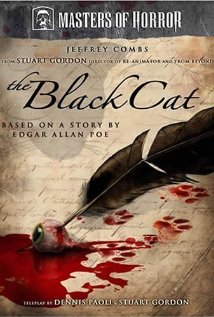 |
Cover art THE BLACK CAT |
MARK: How did you approach the adaptation of The Black Cat? Especially using Poe as the protagonist in the adaptation, which Stuart tells me was a mutual idea that the two of you had.
DENNIS: When we were working on The Black Cat, I cast a broad net. I didn’t just re-read the favorite stories, I read all his stories. I didn’t just go back and read the favorite poems, I re-read all the poems. I didn’t just read his biography, I hunted down and read as much of his magazine work as I possibly could, including a series on interior decoration; on hand-writing of other authors—(laughs) What seems the most trivial subjects that he would invest a great deal of intelligent and real talent writing. It was fascinating to see.
MARK: As you’ve never been on a set of one of your scripts, what did you think of The Black Cat?
DENNIS: I thought The Black Cat came out great. And that film is much more of a fantasy, you know, that’s much more of a fantasy of Poe’s life, as opposed to Nevermore, which, you know, again, is a fictional situation but it’s one that Poe found himself in often.
The Black Cat had a trope in it-- that Poe had this episode in his life where he was--- an alcoholic episode in his life where he believed the experiences of “The Black Cat”. So we were making a comment on the relationship of art and life.
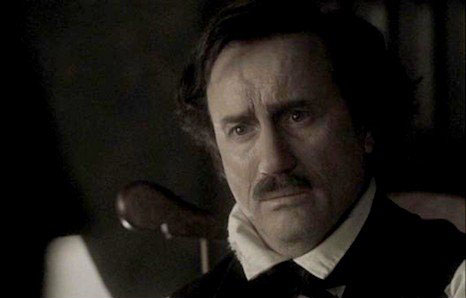 |
Jeffrey Combs in the Masters of Horror episode The Black Cat |
MARK: You mentioned “The Imp of the Perverse”, and I want to come back to “The Black Cat”, but I wanted to know if you’ve had a chance to read Paul Collins new biography, Edgar Allan Poe : The Fever Called Living?
DENNIS: No, not yet! It’s on order, now, actually. Is it any good?
MARK: It’s great. I recommend it as a great “starter” bio to get into Poe, and then move onto the more academic biographies. It’s a great read. And Collins “gets it”. He gets Poe’s struggle as a writer, and his career as an evolving writer and editor.
DENNIS: When you think about it, that was Poe’s tragedy.
MARK: Poe’s a jobbing, working writer for hire, churning out stuff like the article on interior decorating…
DENNIS: When you think about it, that’s Poe’s tragedy. That’s his tragedy. That he looked upon it as a real frivolous waste of his talent and yet, while he was doing it, he COULD NOT keep himself from investing himself, and his talent, in that work. It was going out in HIS magazine. But I do believe it was just the way he had to work.
MARK: All or nothing.
DENNIS: It was his relationship to the page and the pen, and it had to be that way.
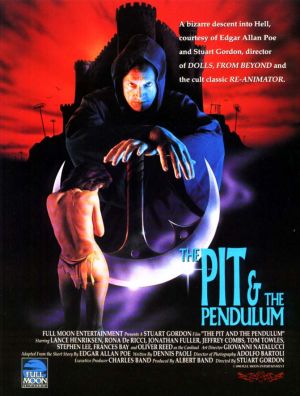 |
Cover art for THE PIT AND THE PENDULUM movie poster |
MARK: I want to jump for a moment before we talk about Nevermore again…So, you have a long and artistically fruitful collaboration with Stuart Gordon, and then Jeffrey Combs. The film Re-Animator (1985) comes along. There’s a history behind Re-Animator that I’d love to get into one day—it was kicked around as a play (now it’s a musical based on the film!), a potential television series, then eventually the 1985 film…
I’m curious about the film The Pit and The Pendulum. How’d that come about?
DENNIS: We love Poe! And at that time, Stuart was just considering projects to do and he could present projects to others and Pit and the Pendulum is a great story but it opens up—the problem with the movie adaptation is how do we get the character to that moment under the pendulum, the swinging pendulum?
it was the same kind of collaboration with Poe that Nevermore was. It was taking Poe, as we had in several case taken Lovecraft, and tried to be faithful to the spirit of the stories while opening the story up to a film narrative, ands once we started talking about it the ideas just started flowing out.
Of course, when we were under the impression while working on it we were going to have a much larger budget than we ended up having! The fact is, it’s called “The Pit and the Pendulum”, but we cut the pit! (laughs). There were twenty pages, which is essentially twenty minutes, spent in the pit. Several characters, several cannibalistic characters…trapped in this pit…also, we lost some of the great political undertones that we thought were really fascinating.
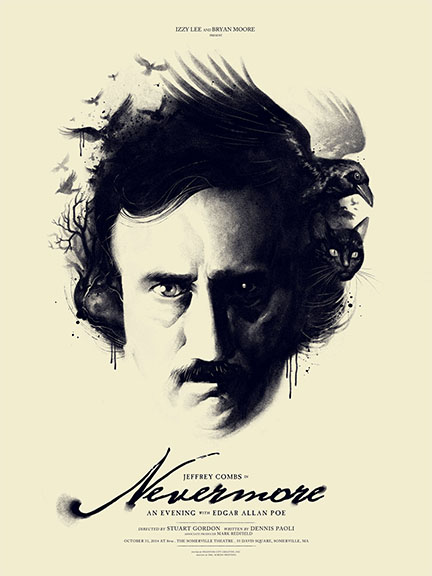 |
New NEVERMORE art - Print poster art |
MARK: let’s chat about methodology for a moment. I want to jump to Nevermore as we touched on this with The Black Cat; How did you research Nevermore? Work on it?
DENNIS: I looked at the issues of his own character, the major conflicts in his life. The fact that his values, his core values, and his core values was poetry. Primarily poetry and the fact that he felt under-appreciated. And the fact that he lived in such extreme poverty is a very traumatic thing and such an awful struggle that he had to go through.
The fact that he had lost his wife. The love of his life, and yet was somehow casting about for another female figure, and we can trace that back to his losing his mother. The lines of the conflicts that he was struggling with at that point in his life became so clear, reached so clearly back to his own work, to the situations in his own life.
His childhood, his having been orphaned to his struggle as a writer, to his struggles to evolve his own character. Because he, left to his own devices much of his life, seemed to pick up his life-lessons as he could, along the way.
And these themes, the threads of his life came together so clearly for me that it was fascinating and exhilarating to put together the sort of statements from different points of his life—from his letters and his prose, that crystallized those values and feelings and those conflicts.
The difficulty was structure. Structuring them out, but what helped were the works that were chosen as part of the reading. How did they connect with his life and how did they open up? How did they crack open the conflicts and let his reminiscences and complaints, and his passion, pour out?
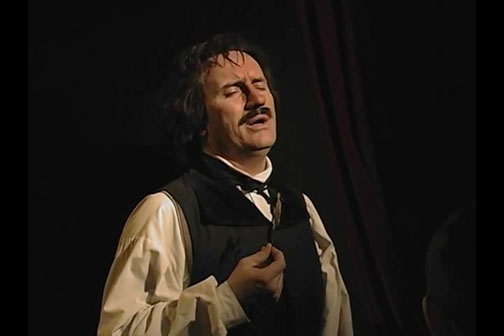 |
Jeffrey Combs in Nevermore: An Evening with Edgar Allan Poe. |
Once we found that, once we let his works structure the piece, his life—he just came to life. And all the quotes and statements of Poe’s that I was able to pull came from entirely different decades of his life, but they are indeed things he said—attributable to him. They make up 75%-85% of the script. It was letting him speak for himself. And what was wonderful is, once you do that, I started to speak like Poe, I was able to start writing sentences like his. I stated to use vocabulary the way he did.
I felt like I was collaborating with Poe. It was spectacular. It’s one of the great writing experiences I have.
MARK: And it’s one of the great instances of that unpredictable alchemical magic that happens between writer, director and actor. I would still love to see a film of this made some day. I don’t want to f=give up too easily!
DENNIS: I think the film script of Nevermore is..I love…we have a script.
MARK: Jeffrey’s very keen on the movie script.
DENNIS: Yes! We love the script! The script actually dramatizes all of the Poe pieces in the play. As Poe recites them, he lives through “The Tell-Tale Heart”, and also through some really fantastic moments, which are, almost like pure imagination visualized—his poems to Helen. In “Annabel Lee” we find, and in “The Raven”, we find that they are incredibly dramatic and it’s all designed to be visually stunning. It sounds like something like “The Raven” would be claustrophobic, I mean it’s a bird and a room---but it’s a spectacularly rich visual environment that Poe creates in that poem if you look at it.
And if you take a couple of suggestions from each of those pieces and cull them, you get some magical moments.
I think we have a script that would not only satisfy fans of Poe but would reach out and make new fans for him. In an entirely different medium which didn’t exists when he was writing. There are filmic things about his work. In some degree, the acute visual descriptions in some of his work, like “The Tell-Tale Heart” are fantastically film-worthy. They anticipate film.
We’d love to see that script get made. We’d love to see that movie made.
MARK: I’m not going to count it out just yet.
DENNIS: Never! I got the script right here! Whenever they’re ready, we’re ready!
-------------------------
“This is Poe in his own words. Our text is taken from his letters and essays and we have based our evening on reviews and reports of his actual appearances. Our goal is to present a sense of the fascinating man behind the poetry and brilliant tales, a man who could be his own worst enemy, and whose life was even more bizarre and tragic than his strangest story.”
- Stuart Gordon, October 2014
Redfield Arts Audio Presents “Nevermore, An Evening with Edgar Allan Poe”. Starring Jeffrey Combs. Written by Dennis Paoli. Directed by Stuart Gordon. Produced for audio by Mark Redfield. Incidental Music by Natalie Combs. Sound Design by Jennifer Rouse. Cover Photo by Ward Boult.
Running Time: approximately 90 minutes
Distributed by Oasis Audio
Produced by Redfield Arts Audio
Copyright 2020 The Mark Redfield Company
On Audible
US
https://www.audible.com/pd/Nevermore-Audiobook/1645553361
UK
https://www.audible.co.uk/pd/Nevermore-Audiobook/1645553361
Canada
https://www.audible.ca/pd/Nevermore-Audiobook/1645553361
Australia
https://www.audible.com.au/pd/Nevermore-Audiobook/1645553361
India
https://www.audible.in/pd/Nevermore-Audiobook/1645553361
Other great platforms
Kobo
https://www.kobo.com/us/en/audiobook/nevermore-an-evening-with-edgar-allan-poe